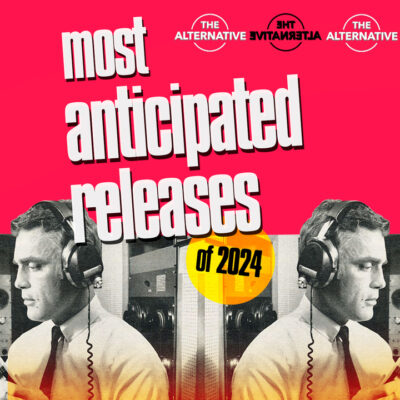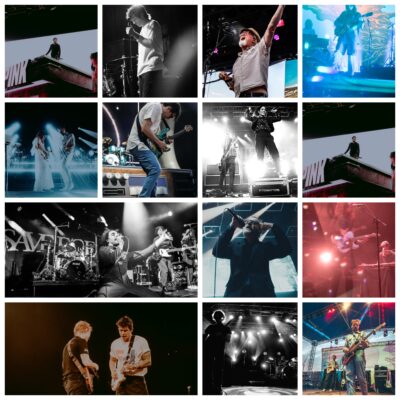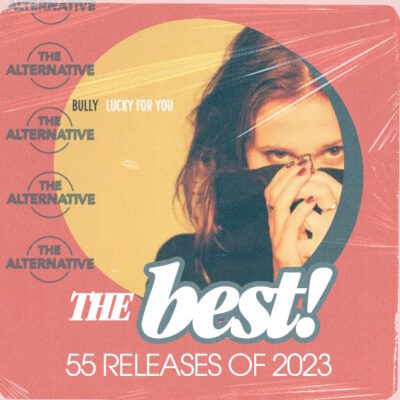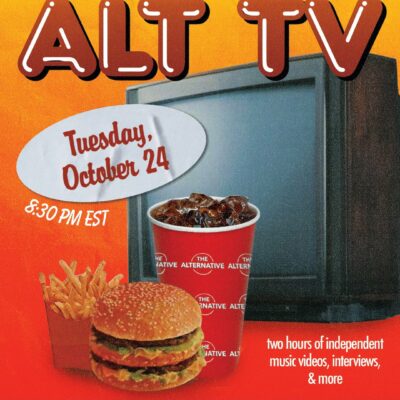Interview: I’m Glad It’s You’s Kelley Bader
Posted: by The Editor
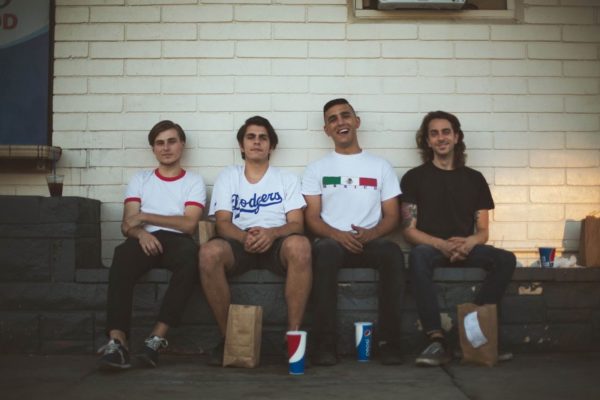
Earlier this month, I’m Glad It’s You frontperson Kelley Bader re-imagined a handful of songs from the group’s 2016 album, The Things I Never Say. Sloshed in a creamy, synth-pop dream, Bader took an entirely new spin on a few of the band’s staples.
After an unfortunate accident, leading to the loss of the group’s van, and a new urgency for introspection, Bader decided to play solo for a bit. Soon realizing that certain IGIY (I’m Glad It’s You) songs didn’t feel right to play alone, Bader fell into a rabbit hole of inspiration, trying to repurpose what he felt needed new life. Listen to these re-envisioned tracks below as you read our interview detailing Bader’s creative process, IGIY’s break, and more.
The Alternative: What made you want to re-work these songs in particular?
Kelley Bader: These three songs were actually giving me a lot of trouble in a solo setting. I knew most of the songs required a little rearranging, some of them sounded better if I kept them straight forward, but these three in particular were not working out. When I played these alone, they sounded really weak and felt awkward, and playing alone at the time was still new and awkward enough.
It started with getting a metronome to play along with, just giving a beat to the performance helped out a lot right off the bat. From there, ideas of other melodies and sound layering came pretty quickly. That sort of lead into me getting carried away with some keyboards and plug in synths I had. So in a way, their selection was the product of them being the most difficult songs to perform in the set. But to be sure I spent the extra time on them because I really wanted these songs to be in the set. We had never performed “Parking Tickets” in the past so that was a goal of mine. The other two are songs that I’ve always loved playing live, and because they are higher energy songs, I was really interested in what a softer approach would do for them.
What was the inspiration behind reimagining the songs in this way? What was the creative process like?
I like to think I had a plan in mind when I started working on the songs, but necessity and obsession actually bore the brunt of the inspiration for the songs. I really felt like the songs needed something to help them out in a solo setting and once I started working on them, I couldn’t stop. It was incredibly fun. But the feel and sounds of the songs themselves, the 80’s style synth layers and drum machine were prompted from almost exclusively listening to David Bowie for the preceding months. The sounds and arrangements themselves don’t pull on much of Bowie’s catalog outside of Let’s Dance, but I wanted the sonic sensibilities of the arrangements to hint at some of the aesthetics of the Ziggy Stardust/Aladdin Sane era. I’m not sure to what degree they actually do that, but that was always in the back of my mind.
Evan had sent me some keyboard plugins for different recording workspaces he’d been trying out and I rolled with them. The process itself was extremely time intensive, but not at all unenjoyable. After finding melodies to layer over the guitar, I’d sit at my desk and play with sounds for hours. A deadline would have been wise in this area, and I’ve since learned that lesson. Unrestricted time isn’t alway great for creative processes. They went through so many different versions before they became what they are. I had Evan’s help with referencing the sounds and mixes quite a bit here and it felt great to have someone else in the band step into the creative process with me.
How long did it take to complete the tracks? How were they mastered/produced?
There were a few months spanning the time I started working on them to their completion, but a lot of that time includes weeks in which I would walk away from them and come back a week or two later. Like many of my current favorites, I had decided to record and mix them myself in my room with the gear I had picked up over the years. But unlike most of them, I’m new to it and not great at it. The project definitely didn’t need this much time, but my relative inexperience with recording and mixing meant I really didn’t have a good idea how ‘completed’ they were at any given time. There was a lot of simultaneous Google-ing and learning on the fly, but there are so many resources available it clicked pretty quickly. Sarah Register mastered them and did an amazing job of filling them out and making them feel much better in every setting.
Is there any particular reason why you’ve been taking on so many solo shows as opposed to full band?
The solo shows have been in response to the reality of our current situation and a certain sort of experiment. After losing our van, touring the way we were has been out of the question. And with the aftermath of the accident still very present, the next steps for the band were really unsure. I think we all felt compelled to continue, but how that would look and what that would mean needed to be figured out. There’s a lot of accompanying existential questions and personal interrogations not wholly unrelated to the band, but in a new and distinct category that we all needed to work with for a while before fully jumping back into this. In the meantime, I felt that playing shows alone allows everyone to have some time and allows me to do what I felt was right for me. It’s an experiment in the way of seeing what could be possible for IGIY. To be sure, I don’t want to transition exclusively into a solo act. While this has been an experience I’m overwhelmingly grateful for, one that I’ll undoubtedly revisit, and one that I’ve already learned a great deal from, my hopeful vision for the band still includes others, particularly the people in the van with me last summer.
Do you think fans have welcomed this new sound for solo shows or does there seem to be some reluctance?
So far the response at shows seems to be very positive. I think part of that comes from the inventiveness of it, just something different than expected. But to be sure, the response is different from that at full band shows. I think the experience is an altogether different environment, which I can see being challenging for people at times. It’s definitely been a new challenge for me to get people to step into a different space with me. I think of it as two different modes of catharsis, one obviously more energetic and the other much more vulnerable. For this year the solo setting seems to be the more appropriate environment for me to exist in. Not only has it made me think of our songs in new ways and consider how others experience them, it’s made me think about what music in general might be capable of doing for someone else. This has made me reconsider the way I think about songwriting the most; how could IGIY be something that intentionally offers something good to people. Fortunately, I think anything sincere from anyone already accomplishes this. But the question has still be sitting around with me for a while. In either setting, I’ve come to like both of the interactions a show encourages. The solo setting has prompted a lot of amazing heart-to-heart connections with people after the set. But I think this is something I’m learning to welcome in full band settings as well, something I think could be better replicated with a band and lots of volume.
Can you give some advice to smaller bands who may be struggling to find their footing?
I’m a big fan of the tried and true ‘just be yourself’ approach. I can anticipate the disappointment in that response, but I honestly believe it’s the only way to walk away happy and content with what you’ve made. Don’t worry about sticking to forms or behaviors you find ‘effective’ in other bands live performances if it’s not actually the expression you want to share with anyone else. Make clear to yourself what you want with whatever you’re doing from the start and work at it. Be open to changing your answer to that type of question down the line if you need to, but keep answering it yourself. Try to find that sweet mysterious balance of really putting yourself into it and not taking yourself too seriously at the same time.
How has it been like working with 6131?
The label has been amazing. They’re great people, always eager to offer help, and take time to involve themselves in the band and where we’re going. I’ve been fortunate enough to meet the whole team at this point and it’s a solid team. Strictly winners. I spend most of my time talking with Joey who I consider to be an all around amazing person. He in particular helped a lot with this solo stuff and I couldn’t have done most of it without him. In fact, I’m currently typing from the road in Austin on a tour he had a strong role in orchestrating.
Any plans for the future? Any plans for new releases?
After some time letting things settle, we’ve been working on a new record. We’re taking our time with this one, and I am anticipating that it is going to take us some time to make the record we need to make. With that in the works, we have some touring plans for the rest of this year and next year. But the record is what’s really important to me right now.
Follow I’m Glad It’s You on social media:
Facebook // Twitter //Instagram
—
Emily Kitchin | @deathnap4cutie
The Alternative is ad-free and 100% supported by our readers. If you’d like to help us produce more content and promote more great new music, please consider donating to our Patreon page, which also allows you to receive sweet perks like free albums and The Alternative merch.






